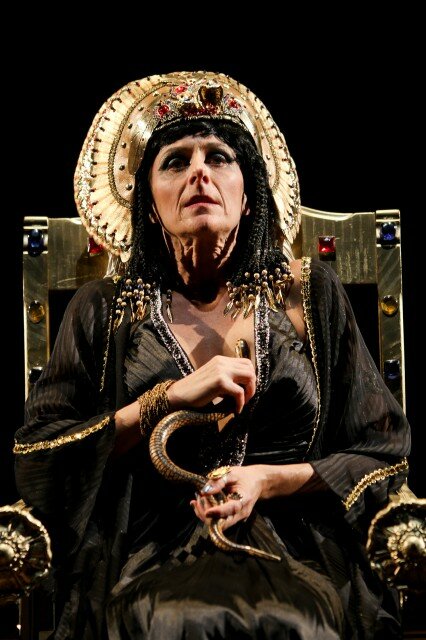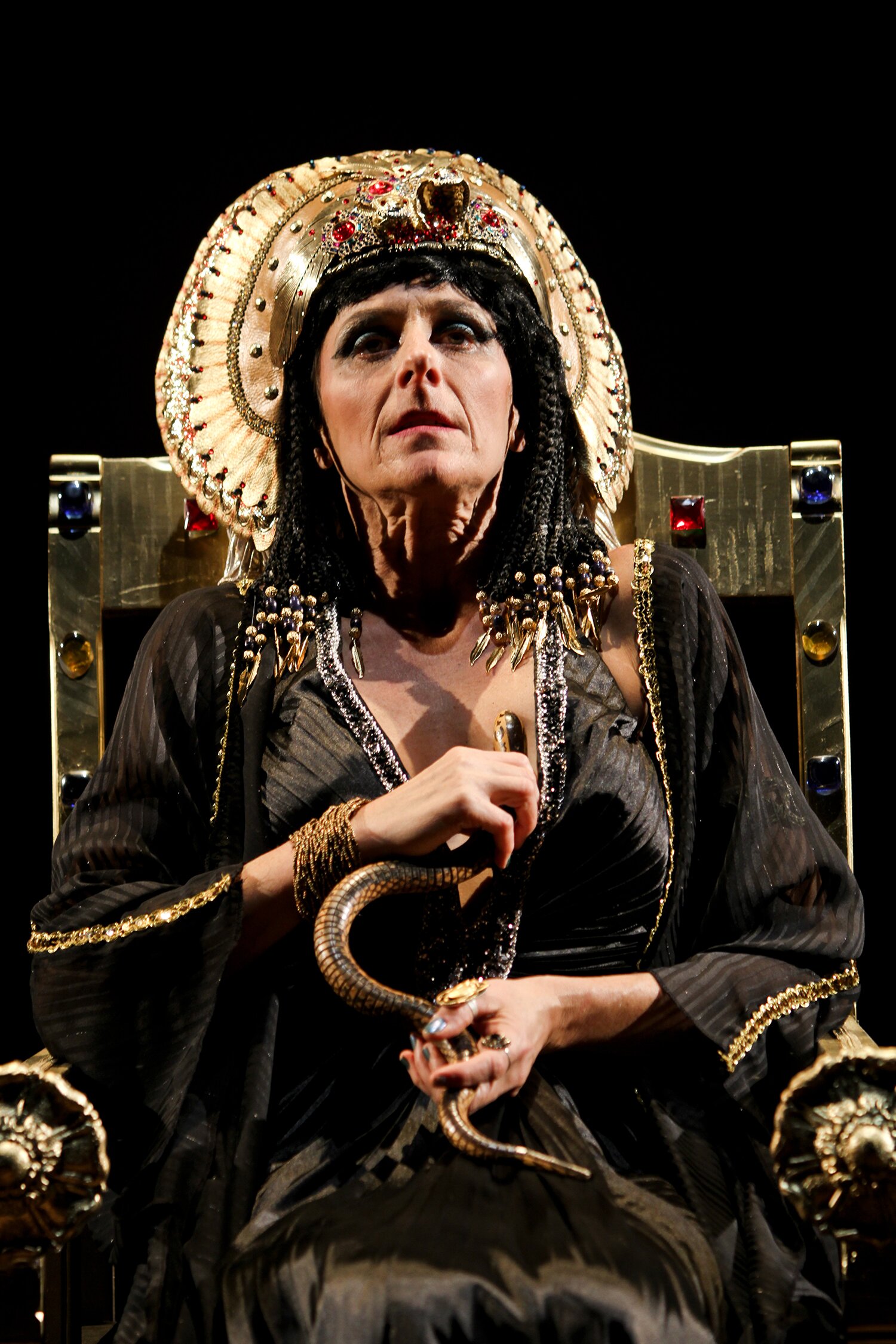
The center does not hold in the Seattle Shakespeare Company production of Antony and Cleopatra (through November 18th; tickets) at The Playhouse at Seattle Center (the Intiman space). That center, in this case, is the husband-and-wife novelty act of Hans Altwies and Amy Thone, playing the ill-fated title roles of this tragedy. We spend most of the play wishing their characters would hurry up and die.
The production is admirably consistent yet woefully misconceived. Director John Langs has added confusion to poor character choices with some half-hearted stabs at socio-political commentary in costuming and choreography.
An opening dance sequence needlessly establishes the decadence of the Egyptian court with movement that layers the mysticism of Dervish whirling with orgiastic writhing. This makes for a discomfiting association between current spiritual practice and the hedonism of the ancient court. To the production’s credit, other design elements suggest that this conflation is accidental and Langs is pursuing something more simplistic.
Pete Rush’s costumes imply an Egyptian/Roman conflict as surrogate for our current East/West confrontation. At one end of the scale is the soothsayer’s caftan, emblematic of the East as organic and emotional. At the other end the West is all control and intellect as suggested by the 19th-century officers’ garb and 21st-century riot-cop battle gear of the Roman army.
Between them lies the Hollywood-slick rebel-chic of Pompey’s troops. Evidently they have escaped The Matrix films in order to rule the Mediterranean waves, though there isn’t a swatch of the nautical about them. As a whole it feels silly and more ambitious than smart.
As for the acting, the company delivers the verse with an ease that sometimes loses its pulse in the naturalism of their delivery. They are less successful with their characterization. Thone does nothing to mitigate Cleopatra’s cloying capriciousness with any sort of humanity or regal qualities that suggest she is anything more than physically attractive. Altwies’s Antony feels less like a charismatic military leader than an inept politician driven by nothing more than an inflated sense of self-worth.
With lead performances like these, the supporting cast gets a great opportunity to shine, which they do to varying degrees. Charles Leggett’s Enobarbus is serviceable but his death scene achieves no catharsis given Antony’s failure to deserve it.
Darragh Kennan makes for a clownish yet unsympathetic Octavius Caesar. He appears profoundly uncomfortable in his own skin and uncompromising with all. While Kennan is amusing as ever, his Octavius is insufficiently complex to provide an enlightening foil for Antony.
Dan Kremer’s Lepidus and Sydney Andrews’s Octavia are among the few to wholeheartedly win our sympathy. In the midst of the bluster and bravado of the drunk scene on Pompey’s galley (the show’s artistic high point), Lepidus’s vulnerability and honesty shine convincingly.
Andrews inspires both sympathy and pity in the bit role of Octavia. We feel sympathy for her grounded characterization of this political pawn and pity for the attempts to play her pregnancy for laughs. Meanwhile Kennan’s menacing Caesar is all deceitful subtext in welcoming Octavia back to Rome when Antony abandons her, missing another opportunity to give truthful complexity to his character.
Costuming suggest that these questionable choices are director-driven as individual pieces exacerbate the actors’ inclinations. Kennan wears his 19th-century military garb buttoned up and pressed. Leggett does Che Guevera in drab fatigues and a red beret. Antony and Cleopatra’s battle gear exposes the sham of their characterizations. Cleopatra goes to war in an intrusively ludicrous outfit while Antony looks childlike in coveralls and gilded life jacket armor.
The positive side of the design is mostly in the set, and the talented designer, Jennifer Zeyl, produces some clever and effective ideas here. A central sandbox keeps Egypt present in all the locations of the sprawling narrative just as Egypt and Cleopatra are (nearly) ever present in Antony’s heart and mind. In many scenes, the ways this pit divides or draws together characters provides the production’s only nuance.
The floating platform of the final scenes is creative and interesting—if challenging for some sightlines—but the noise that accompanies its entrance and adjustments is distracting. The simple set dressing of the galley scene is far more effective.
In the battle scenes, the choreography mostly takes up time and space. It tells us that a battle is happening without furthering the plot or our understanding of the characters, or conveying the emotional experience of the bloodshed. The single moment that stands apart from this is a stillness in which an individual soldier is shot multiple times in a spotlight. Clearly Langs and choreographer Mollye Maxner recognize their success here as they repeat the moment. Now if only Langs had recognized and excised the weak parts of the production, we’ve have much more fulfilling evening.
